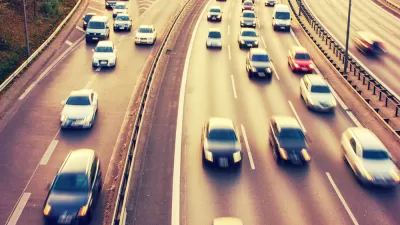Rising gas prices aren't just encouraging more transit use, they are making public transit more expensive, and charging more for tickets and passes hurt low-income riders the most.
"With West Coast gasoline prices averaging $4.41 per gallon, even car-crazed southern Californians are joining the nation's slow move away from the automobile and toward public transportation. But even as more Americans pile onto city buses, subways, and suburban trains, the increase at the pump is also hitting transit agencies hard.
In many cases this means fare hikes and service cuts. So far this year, nearly half of metropolitan bus operators surveyed by the APTA said they had increased prices to address the strains of rising fuel costs; 19 percent said they had reduced service.
Such fare hikes are hurting the poor disproportionately. While more of the country's suburbanites are choosing mass transit, many of the nation's poorest urban dwellers, whose only option is often public transportation, aren't riding at all because of fare hikes and the downturn in the economy, transportation experts say. Some no longer have a job to commute to, they add.
Los Angeles is in the thick of the quandary. While LA Metro's subways saw a 7.13 percent increase in ridership from April to June compared with a year ago, bus ridership was down 1.9 percent in the same period. Mr. Littman, the Metro spokesman, blamed the drop on a fare hike that raised monthly passes by $10 to $62.
As the country's third-largest public-transit network, behind New York and Chicago, respectively, the LA Metro needs to expand faster than it is to meet the demands of a rapidly increasing population. The Metro board's solution: a new tax. It wants to increase the county sales tax by a half penny, a controversial proposal that could go to Los Angeles voters in November."
FULL STORY: FUEL COSTS STRAIN U.S. MASS TRANSIT, TOO

Manufactured Crisis: Losing the Nation’s Largest Source of Unsubsidized Affordable Housing
Manufactured housing communities have long been an affordable housing option for millions of people living in the U.S., but that affordability is disappearing rapidly. How did we get here?

Americans May Be Stuck — But Why?
Americans are moving a lot less than they once did, and that is a problem. While Yoni Applebaum, in his highly-publicized article Stuck, gets the reasons badly wrong, it's still important to ask: why are we moving so much less than before?

Using Old Oil and Gas Wells for Green Energy Storage
Penn State researchers have found that repurposing abandoned oil and gas wells for geothermal-assisted compressed-air energy storage can boost efficiency, reduce environmental risks, and support clean energy and job transitions.

Minneapolis Bans Rent-Setting Software
Four cities have enacted restrictions on algorithmic software that can inflate rent costs.

Oakland to Add 244 New EV Chargers
Oakland plans to launch its new charging network at eight locations by the end of 2025.

Jane Goodall Inspires with Message of Hope, Resilience, and Environmental Action
Speaking in Pasadena, Jane Goodall offered a hopeful and inspirational message, urging global compassion, environmental responsibility, and the power of individual action to shape a better future.
Urban Design for Planners 1: Software Tools
This six-course series explores essential urban design concepts using open source software and equips planners with the tools they need to participate fully in the urban design process.
Planning for Universal Design
Learn the tools for implementing Universal Design in planning regulations.
Heyer Gruel & Associates PA
City of Moreno Valley
Institute for Housing and Urban Development Studies (IHS)
City of Grandview
Harvard GSD Executive Education
Salt Lake City
NYU Wagner Graduate School of Public Service
City of Cambridge, Maryland





























